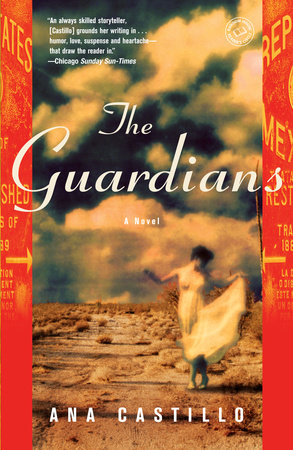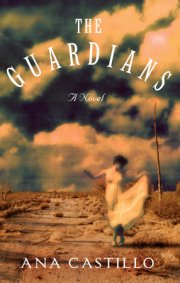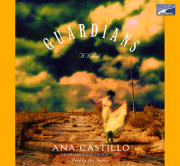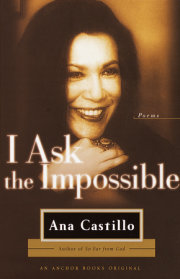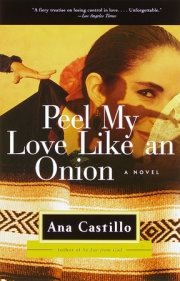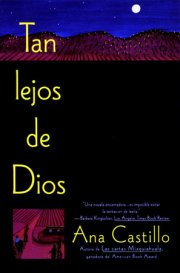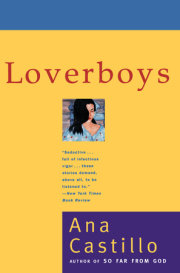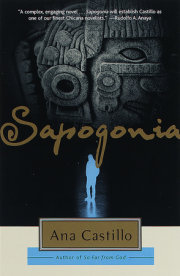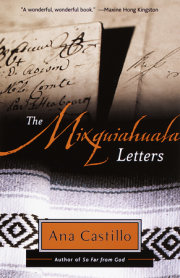REGINA
It was raining all night hard and heavy, making the land shiver—all the bare ocotillo and all the prickly pear. In the morning we found a tall yucca collapsed in the front yard. Everything is wet and gray so the day has not made itself known yet. It is something in between. As usual, I’m anxious. Behind the fog are los Franklins. Behind those mountains is my brother. Waiting. On this side we’re waiting, too, my fifteen-year-old nephew, Gabo, and his dog, la Winnie.
Winnie has one eye now. She got it stuck by a staghorn cactus that pulled it right out. Blood everywhere that day. By the time Gabo got home from his after-school bagger’s job at el Shur Sav, I was back from the vet’s with Winnie, rocking her like a baby. You couldn’t blame the dog for being upset, losing her eye and all.
I kept Gabo this time around because I want him to finish high school. I don’t care what the authorities say about his legal status. We’ll work it out, I say to Gabo, who, when he was barely walking I changed his diapers, which I also tell him. He’s still embarrassed to be seen in his boxers. That’s okay. I’m embarrassed to be seen in mine, too. Thirty years of being widowed, you better believe I dress for comfort.
“Stop all this mourning,” my mamá used to say. “You were only married six months. The guy was a drug addict, por Dios!” She actually would say that and repeat it even though Junior died fighting for his country. That’s why we got married. He was being shipped off to Vietnam. If the coroner suggested he had needle tracks, well, I don’t know about that.
Mamá always had a way of turning things around for me, to see them in the worst light possible. It’s probably not a nice thing to say you are glad your mother’s dead. But I am glad she’s not around. Can I say that and not worry about a stretch in purgatory? Then I’ll say that.
We’ve been waiting a week, me and Gabo—for his dad to come back. He’s been back and forth across that desert, dodging the Border Patrol so many times, you’d think he wouldn’t even need a coyote no more. The problem is the coyotes and narcos own the desert now. You look out there, you see thorny cactus, tumbleweed, and sand soil forever and you think, No, there’s nothing out there. But you know what? They’re out there—los mero-mero cabrones. The drug traffickers and body traffickers. Which are worse? I can’t say.
So the problem is Rafa, my brother, can’t just come across without paying somebody. Eight days ago we got a call. It was a woman’s voice. She said in Spanish that Rafa was all right and that he was coming in a few days so we had better have the balance of the money ready. Who did those people think they were, I asked myself. That woman on the phone acted so damn cocky. I swear, if I knew who she was, I’d report her to the authorities, lock her up for five years. How dare she treat people like that? Take advantage of their poverty and laws that force people to crawl on their bellies for a chance to make it.
Truth is Rafa should have just stayed here last time he came to work the pecans. That’s when he finally let me keep his son. Someone in the family’s got to finish high school, I said to him. Poor Rafa, all alone like that now, going back and forth, even though I think he has a new wife down in Chihuahua. He won’t say nothing out of respect for Gabo’s dead mother. Just the mention of Ximena and the boy falls apart. It’s been almost seven years now but Gabo was just a child. His mind sort of got stuck in that time when his mother didn’t make it. He was here with me that winter, too. When Rafa and Ximena were returning they got separated. The coyotes said no, the women had to go in another truck. Three days later the bodies of four women were found out there in that heat by the Border Patrol. All four had been mutilated for their organs. One of them was Ximena. It was in all the news.
I’ve been fighting to keep my sobrino since then but my brother gets terco about it and keeps insisting on taking him back to the other side. What for? I tell him. Because he’s Mexican, Rafa says. As if I’m not, because I choose to live on this side. He’s got to know his grandparents— meaning Ximena’s folks. He’s not gonna become a gringo and forget who he is, my brother says of his only son, as if getting an education would erase the picture the boy keeps in his head of how his mother died.
I stayed and worked here in Cabuche, first in the pecans and cotton. Because of marrying Junior, I got his army benefits. I could stay and not hide in the shadows no more. This meant no more picking, no more peeling chiles, and no more canning. Instead, I got up my courage one year and signed up for night classes at the community college. I did pretty good in my classes. I really liked being in a classroom. I liked the desks, the smell of the chalk and erasers, the bulletin boards with messages about holidays like Valentine’s Day and Martin Luther King Day. So later I got more courage and applied for a job as a teacher’s aide in the middle school. That’s how I bought my casita, here on the mesa, where I can’t see los Franklins this morning. But I know they are out there, playing with me. Like giants, they take the sun and play with people’s eyes, changing colors. Like shape-shifters, they change the way they look, too. They let the devoted climb up along their spines to crown them with white crosses and flowers and mementos. They give themselves that way, those guardians between the two countries.
I do not know what Rafa is talking about his son becoming a gringo. These lands, this unmerciful desert—it belonged to us first, the Mexicans. Before that it belonged to los Apaches. Los Apaches were mean, too. They knew how to defend themselves. And they’re still not too happy about losing everything, despite the casinos up by their land. “Keep right on going,” they’ll tell tourists when they try to pull over on the highway that cuts across it during dry season.
Ha. I wish I could say that out here whenever some stupid hunter wanders near my property. It’s just me and the barbed-wire fence between the hunter and government land where he can do what he pleases, all dressed up like if he was in the National Guard.
One day we heard some shots. It wasn’t even dawn yet, that Sunday. Winnie went nuts—the way heelers do at the sign of something amiss. Gabo got up—pulling up his jeans, tripping on the hems of them, barefoot. “What was that, Tía?” he said, all apurado and the dog, meanwhile, barking, barking. This was before the accident, when she could practically see in the dark. I let her go out, and la Winnie ran toward the fence that divides my property and BLM land. “HEY, HEY!”was all my poor nephew called out. He always freezes up. I think he remembers his mother.
Over in El Paso people have asked me if I’m not afraid of the coyotes and rattlers living right next to the wide-open spaces kept by the Bureau of Land Management. The worse snakes and coyotes, I always say, are the ones on two legs. People think that’s funny.
“Hey-Hey,” Gabo called out again in the dark of the new day out there, with a little less conviction the second time. But la Winnie kept right on barking-barking. I went in the house and got my rifle. When I came out I went up to the fence and pointed the rifle somewhere I couldn’t see. What were they shooting anyway? We don’t got any deer around here. “YOU ARE WAY TOO CLOSE TO MY LAND!”I yelled like I was Barbara Stanwyck or Doña Bárbara or somebody and I took a shot that rang out like a 30-30. It must’ve woken up la gente all the way in town. A little while after that I heard Jeeps taking off.
We couldn’t go back to sleep after that so I made us some atole and put on the TV. I needed to fold up the laundry I’d left in the dryer anyway. Winnie didn’t come in like she would have normally, ready to be fed. She stayed outside roaming the grounds.
“Your father will come back,” I said to Gabo that morning at the table about my kid brother who you’d think was way older than me, his mind full of the beliefs of another time, another era, belonging to the Communist Party and all that. He’s so proud of it, too.
Gabo’s older sister ran off a long time ago with a guy over there in Chihuahua and no one’s heard from her since then. So all Gabo has to count on is his father.
And me, of course, his tía Regina.
But he’s lost way too much already in his short life to know that for sure. So that’s what I’m doing right now, trying to do something good— for my brother and Gabo but for me, too—to see that my sobrinito gets a chance. One day I’m gonna take him to Washington, D.C
“What the hell for?” Rafa asked me when I mentioned it.
“To see where the Devil makes his deals,” I said.
One day I’m gonna take my nephew to New York, too, where I’ve never been but it’s on my list—my very long list—of places to see in this life. I may even take him to Florence, Italy, to see the David. Well, actually I’m the one that wants to see the statue of David but it won’t hurt for Gabo to know a little something about great art. What? Why not? All our lives we have to be stuck to the ground like desert centipedes? My nephew doesn’t show any signs of interest in the arts. He don’t talk about girls. He goes to Mass every Sunday down in Cabuche. If I don’t drive him or let him take my truck, he walks. He observes all the holy days of obligation. My biggest fear is he’s gonna become a priest. Wait ’til Rafa hears about it. He’ll be so disappointed.
Copyright © 2008 by Ana Castillo. All rights reserved. No part of this excerpt may be reproduced or reprinted without permission in writing from the publisher.

